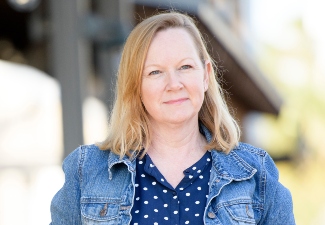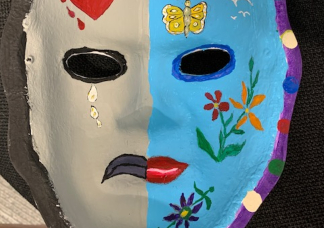Understanding Caregiver Fatigue: Tips from Two Veteran Caregivers

When a loved one is ill or injured, their caregivers are often the ones providing essential support and compassion to help them manage daily life.
However, caregiving has challenges, including physical, mental, and emotional strain. Caregiver fatigue is common. But renewed hope and joy are possible with the right resources and support from others.
Cindy Parsons and Mary Tallouzi were on similar journeys despite living more than 1,500 miles apart. Both are single mothers of Mexican heritage. Both had sons join the Army after 9/11. And both became caregivers after their sons were injured in Iraq.
Though Shane Parsons and Daniel Tallouzi were a room apart while receiving care at Walter Reed Army Medical Center in Washington, DC, it would take another five years for their mothers to finally meet.
The women connected in 2011 at a Wounded Warrior Project® (WWP) orientation. Both were motivated by their experiences as caregivers to become advocates for the evolving needs of military veterans, their families, and their caregivers. Today, they are not only members of WWP’s Warriors Speak® team but best friends, communicating almost daily, motivating, consoling, and laughing with each other.
Life Takes a Backseat

Mary with son Daniel.

Cindy with son Shane.
Cindy and Mary admit that their lives took a backseat to the needs of their children.
“Life stops for the caregiver when they take on that role. When Daniel was injured, I experienced not just the loss of the child I knew but a profound change in my life," said Mary.
“You lose your identity when you become a caregiver. You are no longer a member of your community. You may not even be earning your own wages. You don’t have a normal weekend or a day off. You end up in a corner that feels impossible to get out of,” Mary explained.
During the almost three years she spent caring for Daniel, Mary admitted that she went without medical care for herself.
“I didn’t see my primary care physician the whole time I cared for my son,” she said, noting it took her another seven months after his death in 2009 before she finally sought support for her health.
Tips to Manage Caregiver Fatigue
|
Who is a Caregiver? A caregiver supports another person by helping with daily living. They may take on responsibilities such as personal care and hygiene, medication administration, coordinating with other healthcare providers, and transportation. What is Caregiver Fatigue? Caregiver fatigue or burnout stems from the ongoing demands and stress of caring for another person. The most common traits include exhaustion, irritability, anxiety, and depression. Caregivers by the Numbers According to the 2024 RAND Report, there are 14.3 million military/veteran caregivers in the United States. More than 10% provide care to veterans or military members who served after 9/11.
|
Below, Mary and Cindy share their top tips on navigating and overcoming caregiver fatigue.
1. Accept Offers for Help – And Ask for Help
Mary was first introduced to WWP™ when Daniel was in the hospital and she met a member of the Benefits Services team. “He would call me periodically, trying to help, but he was just a voice on the phone. I didn’t have time for him. I was only focused on getting my son the care he needed,” she said.
Eventually, though, Mary realized that accepting help was crucial. “At one point, I felt so lost with everything. I didn’t know who to turn to and Wounded Warrior Project became a lifeline. If I had a question, wanted to talk through something I was thinking about, or needed help to execute something, I called them,” she said.
Her advice: “If someone offers assistance, take it.”
Cindy echoes the sentiment but adds that speaking up and being specific when you need something is important. “It happens so fast, and you may not realize what you need until later. But you need to voice what you need and why you need it,” she advised.
2. Build a Support Network
Trusting someone else to step in and help care for your loved one is hard. Overcoming that hurdle, though, is significant to avoiding caregiver fatigue.
“It takes time to build relationships with people, whether family, friends, or other care providers, to have the confidence they will care in the same way we do, but it’s necessary to build a solid support system,” said Cindy.
“Connecting with others who understand your experiences and talking with people who understand what you’re going through can be incredibly soothing. They can also be your advocate, your shoulder, your partner in crime,” she said.
Cindy said that WWP was instrumental in allowing her to step away from her responsibilities to connect with other caregivers and build her support network.
She encourages caregivers to learn more about the programs that WWP offers for caregivers and other family members who may also need support.
“Children especially, even if they do not have daily responsibilities for their ill or injured loved one. They may need support, and it’s important for children of wounded warriors to connect with others who can relate to their experiences,” she said.
3. Schedule Self-Care Time
Self-care is essential for caregivers to maintain their mental health and overall wellness. Neglecting personal care can also have consequences for both the veteran and the caregiver.
The 2024 RAND report, America’s Military & Veteran Caregivers: Hidden Heroes Emerging from the Shadows, found that one-third of caregivers needed mental health care but didn’t receive it because they felt they didn’t have time.

WWP enabled Cindy and Mary to connect with other caregivers and build a support network.
“You feel guilty taking time for yourself,” said Cindy, who attributes a breast cancer diagnosis to a lack of self-care. “I was so focused on caring for Shane that I let all my preventative care go. I also didn’t realize until later how depressed I was.”
After attending a WWP caregiver retreat, Cindy realized the importance of self-care.
“If I don’t care for myself, what does that look like for Shane? The result would not be good for him — he would go to a nursing home,” she said. “Once I realized that, I started to pay more attention to myself. I still struggle with it, but I’ll drive to the park, take a walk, get a massage, exercise, and work in my garden.”
And sometimes, she’ll pick up the phone at 3 am and call Mary. “When I’m alone, sitting in pain, when I can’t sleep, when there’s pressure that I can’t get rid of, at that moment, I’ll pick up the phone and talk about it. That’s the only thing that kept me going sometimes.”
Cindy suggests finding activities that bring joy and scheduling the time for yourself. She added that WWP also has in-person and virtual caregiver events and support groups nationwide.
4. Reduce Stress, Build Resilience
When things became stressful, Cindy and Mary found comfort in prayer, exercise, and alternative therapies, which also helped them build resilience.
“You have to find something you can focus on and go to on the spur of the moment. For me, it was meditation,” explained Mary. “Meditation taught me how to bring my blood pressure down and improve my health overall.”
Mary tried several different guided meditations before finding a facilitator she connected with. She continues to rely on this practice today.
5. Seek out Long Term Care Resources – For You and Your Warrior
Questions about who will care for your loved one if you become sick or injured are often top of mind for caregivers. As warriors and caregivers age, new obstacles inevitably arise.

As members of the Warriors Speak team, Mary and Cindy speak at events, sharing about WWP programs and services for caregivers.
“Our needs and the needs our loved ones will manifest in different ways in the future. Being aligned with an organization like Wounded Warrior Project is necessary to ensure you, as a caregiver, don’t get overwhelmed but also that your loved one has the long-term support they need,” said Cindy.
WWP’s Independence Program provides long-term support and high-touch care to the most severely wounded warriors. The program is customized to meet each warrior’s needs and may address various aspects of care, including financial, legal, residential, and vocational/educational. Additionally, the IP team also assists in creating lifelong health care plans and estate plans, including wills, trusts, advanced directives, power of attorney, and the transfer or protection of assets.
Additionally, WWP offers caregiver-specific resources to mitigate stress and enhance support. Peer support groups, mental health care, respite care services, and family support services are available. The Department of Veterans Affairs also has a Caregiver Support Program.
WWP is also actively advocating to improve policies and programs for caregivers, including the service members and veterans they care for.
The Last Word: Be Proactive
Caregiver fatigue is real. When Mary and Cindy travel on behalf of WWP and give presentations, they encourage veterans and their loved ones to manage their health and wellness proactively.
“Everyone deals with stress and depression differently based on what they have dealt with in the past, what their culture is, and what the level of care their loved one requires,” said Cindy. “What’s important is being proactive to avoid burning out.”
Mary concurs: “You need to be your best to give your loved one your best. If you don’t get care for yourself, you can’t give care.”
Contact: Cynthia Weiss – Public Relations, cweiss@woundedwarriorproject.org, 904.738.2589
About the RAND Report
The 2024 RAND report, America’s Military & Veteran Caregivers: Hidden Heroes Emerging from the Shadows, is the most comprehensive study ever conducted on today’s military and veteran caregivers and their families. As a lead funder, Wounded Warrior Project® (WWP) understands that caregivers go above and beyond for warriors, and our priority is to ensure both groups live with hope and purpose.
About Wounded Warrior Project
Since 2003, Wounded Warrior Project® (WWP) has been meeting the growing needs of warriors, their families, and caregivers — helping them achieve their highest ambition. Learn more about Wounded Warrior Project.


